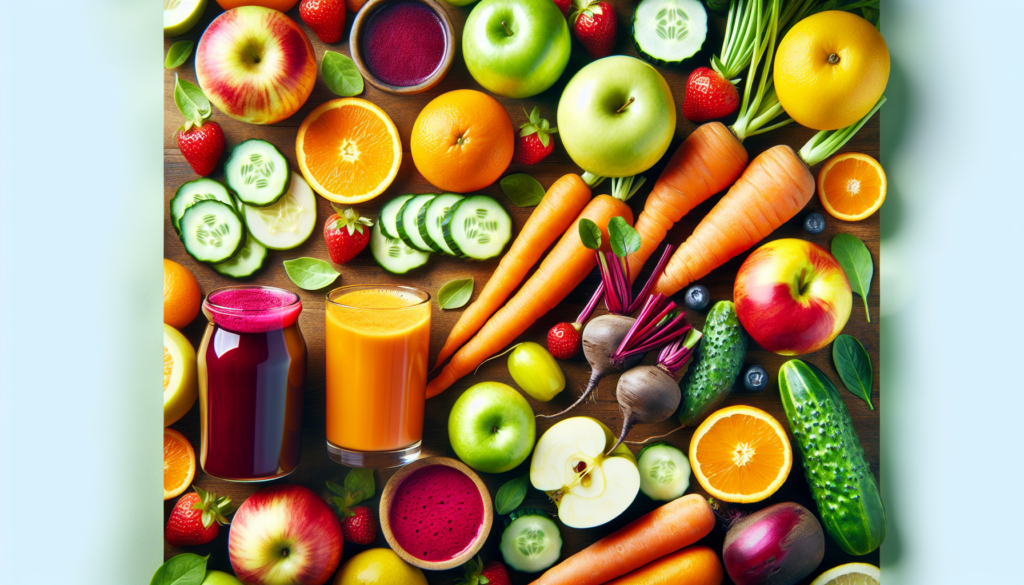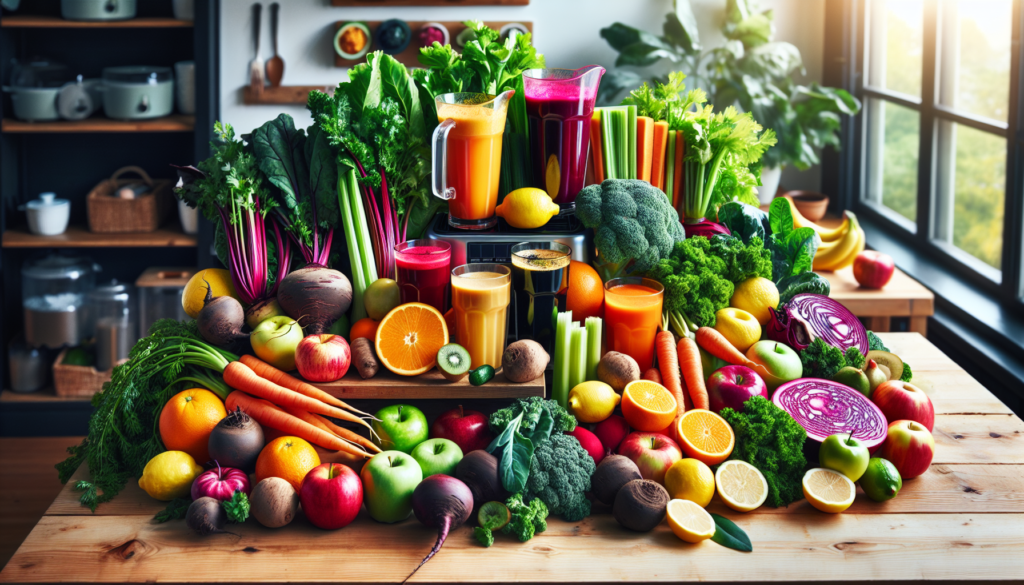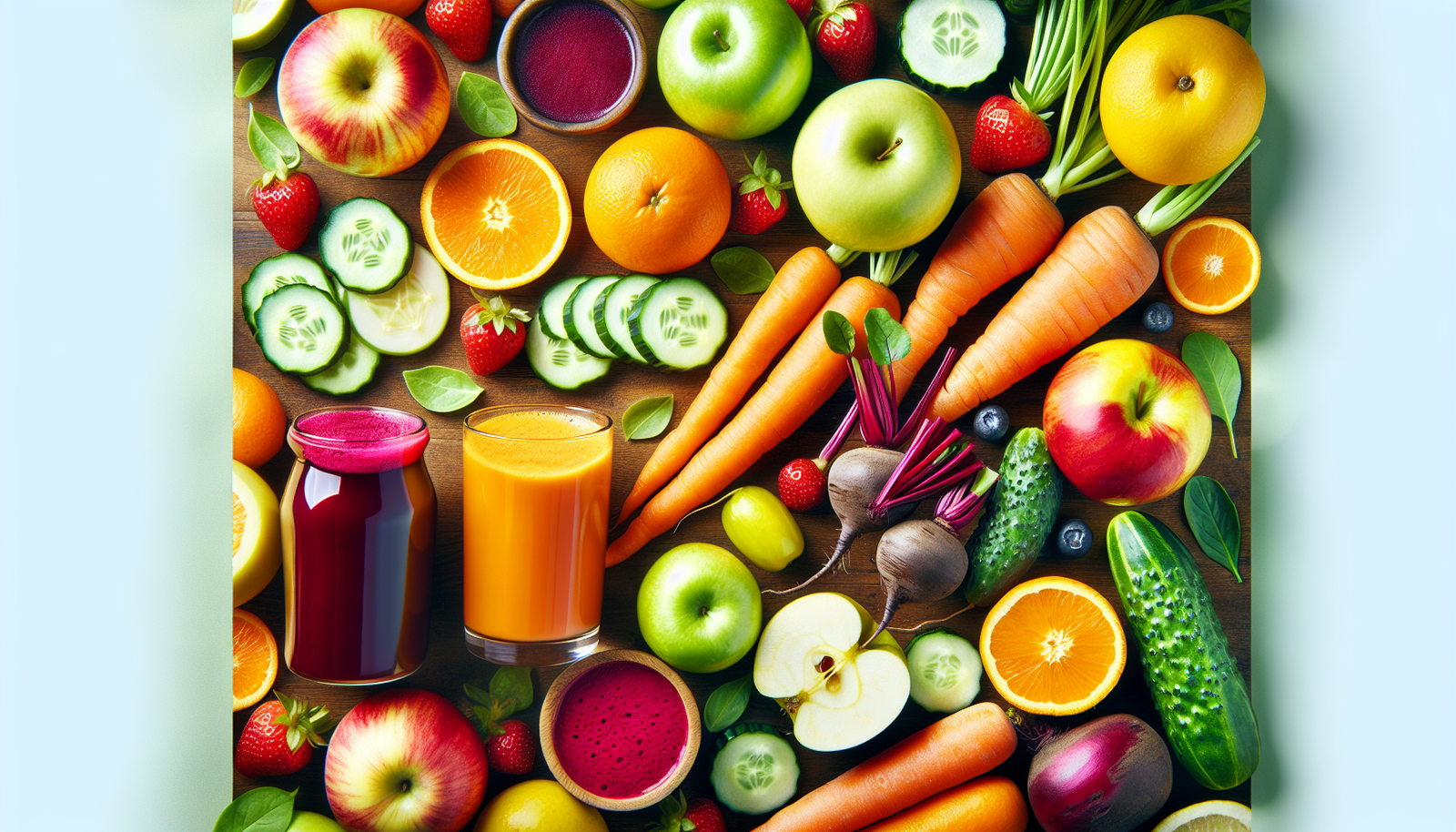Are juice cleanses really as beneficial as they claim to be, or are they actually doing more harm than good? This is a question that has been debated among health experts and enthusiasts alike. While some swear by the detoxifying powers of juice cleanses, others argue that they can be detrimental to your health. In this article, we will explore the pros and cons of juice cleanses, providing you with a balanced perspective to help you make an informed decision about whether or not to embark on a juice cleanse journey. So, put on your investigative hat and let’s find out if juice cleanses are indeed helpful or harmful.
Benefits of Juice Cleanses
Detoxification
One of the key benefits of juice cleanses is detoxification. By consuming only fresh, nutrient-rich juices for a period of time, you give your body a break from processing solid foods and allow it to focus on eliminating toxins. The antioxidants and vitamins present in the juices help to support the liver and kidneys in their detoxification processes, resulting in a cleaner, healthier body.
Weight Loss
Many people turn to juice cleanses as a way to jumpstart their weight loss journey. With their low-calorie content and high nutrient density, juice cleanses can be an effective tool for shedding those extra pounds. By replacing unhealthy, processed foods with fresh juices, you provide your body with the necessary nutrients while reducing your calorie intake. However, it is important to note that any weight loss experienced during a juice cleanse is often temporary and may be regained once you resume your regular eating habits.
Increased Nutrient Intake
Incorporating a variety of fruits and vegetables into your daily diet is crucial for optimal health. Juice cleanses offer a convenient way to boost your nutrient intake, as they typically include a wide range of fruits and vegetables. These juices are rich in vitamins, minerals, and antioxidants, which can enhance your overall well-being and support various bodily functions.
Potential Risks of Juice Cleanses
Nutrient Deficiencies
While juice cleanses can provide a concentrated dose of nutrients, they may also lead to nutrient deficiencies if followed for an extended period. Since juices lack certain essential components like fiber and protein, relying solely on them for an extended period can result in deficiencies. To mitigate this risk, it is important to consider the duration of your cleanse and ensure you incorporate a diverse range of juices to cover as many nutrients as possible.
Blood Sugar Imbalances
Juice cleanses, particularly those high in fruit juices, can cause blood sugar imbalances in some individuals. Without the fiber found in whole fruits, the natural sugars present in fruit juices are absorbed quickly, leading to a rapid rise in blood sugar levels. This can leave you feeling fatigued, irritable, and may even lead to cravings for unhealthy foods. It is essential to monitor your blood sugar levels closely during a juice cleanse and consider including vegetables and low-sugar fruits in your juices to minimize this risk.
Muscle Loss
While juice cleanses can contribute to weight loss, they may also lead to muscle loss if not done properly. Since most juice cleanses are low in protein, a crucial macronutrient for maintaining muscle mass, prolonged cleanses can result in muscle wasting. To preserve muscle mass while on a juice cleanse, it is important to consider incorporating plant-based protein sources such as almond milk or hemp seeds into your juices.

Effectiveness of Juice Cleanses
Scientific Studies
Scientific studies on the effectiveness of juice cleanses are limited, but the available research suggests that they can have some positive effects. A study published in the Journal of Chiropractic Medicine found that participants who completed a seven-day juice cleanse experienced improvements in body weight, body mass index (BMI), and blood pressure. However, it is important to note that these results may vary depending on individual factors such as preexisting health conditions and overall diet.
Anecdotal Evidence
While scientific studies provide valuable insights, anecdotal evidence also plays a significant role in understanding the effectiveness of juice cleanses. Many individuals who have tried juice cleanses report feeling lighter, more energized, and having improved digestion. However, it is essential to approach anecdotal evidence with caution, as individual experiences can vary widely, and personal biases may influence perceptions of effectiveness.
Choosing the Right Juice Cleanse
Consulting a Healthcare Professional
Before embarking on a juice cleanse, it is crucial to consult a healthcare professional, especially if you have any underlying health conditions or are taking medications. They can provide personalized advice and guidance based on your specific needs and help ensure that a juice cleanse is safe for you.
Identifying Personal Goals
To choose the right juice cleanse, it is important to identify your personal goals. Are you looking for a short-term cleanse or a long-term lifestyle change? Are you aiming for weight loss, detoxification, or improved overall health? Understanding your goals will help you select a juice cleanse that aligns with your specific needs and aspirations.
Researching Brands
With the increasing popularity of juice cleanses, numerous brands have emerged offering a wide range of options. Take the time to research different brands, read reviews, and assess the quality of ingredients used in their juices. Opt for brands that prioritize organic produce and cold-pressed juices, as these methods preserve the maximum amount of nutrients.

How to Do a Juice Cleanse Safely
Preparing the Body
To ensure a safe juice cleanse experience, it is beneficial to prepare your body beforehand. Gradually reduce your consumption of processed foods, refined sugars, caffeine, and alcohol in the days leading up to the cleanse. This will help ease the transition and minimize potential withdrawal symptoms.
Gradual Transition
Abruptly starting a juice cleanse can be challenging for your body. Instead, consider a gradual transition by replacing one meal or snack with a juice initially and gradually increasing the number of juices consumed over a few days. This approach allows your body to adjust to the cleanse more comfortably.
Proper Hydration
While juice cleanses provide hydration through the juices themselves, it is essential to complement this with adequate water intake. Aim to drink at least 8 cups (64 ounces) of water per day to stay hydrated and support the body’s natural detoxification processes.
Types of Juice Cleanses
Fruit-Based Cleanse
Fruit-based cleanses primarily incorporate juices made from various fruits. These cleanses are typically high in natural sugars and antioxidants and can be an excellent option for those seeking a refreshing cleanse. However, individuals with blood sugar imbalances or diabetes should approach fruit-based cleanses with caution due to their potentially high sugar content.
Vegetable-Based Cleanse
Vegetable-based cleanses focus on juices made from a variety of vegetables. These cleanses are low in natural sugars and can be beneficial for individuals looking to limit their sugar intake or regulate blood sugar levels. The wide range of minerals and vitamins in vegetable juices can support overall health and well-being.
Combination Cleanse
Combination cleanses, as the name suggests, combine both fruits and vegetables in their juices. This type of cleanse offers a balanced approach by providing a combination of nutrients from various sources. It allows individuals to enjoy the benefits of both fruit and vegetable juices and can be suitable for those seeking a well-rounded cleanse.
Alternative Approaches to Cleansing
Whole Food Detox
A whole food detox involves eliminating processed foods, refined sugars, and additives from your diet while increasing your intake of whole foods such as fruits, vegetables, whole grains, and lean proteins. This approach allows your body to detoxify naturally while providing essential nutrients. Whole food detoxes can be more sustainable long-term compared to solely relying on juice cleanses.
Intermittent Fasting
Intermittent fasting involves restricting your eating window to a specific period and fasting for the rest of the day. This approach allows your body to enter a fasting state, promoting fat-burning and autophagy (cellular repair). While it does not focus exclusively on consuming juices, incorporating fresh juices into your eating window can provide additional nutrients and hydration.
Elimination Diet
An elimination diet involves systematically removing certain foods from your diet to identify potential food sensitivities or allergies. By eliminating common allergens like gluten, dairy, and soy for a specific period, you can observe how your body reacts when these foods are reintroduced. While not specifically a cleansing method, an elimination diet can help identify potential dietary triggers for various health issues.
Common Misconceptions about Juice Cleanses
Permanent Weight Loss
One common misconception about juice cleanses is that they lead to permanent weight loss. While it is true that you may lose weight during a cleanse, much of this weight loss is often water weight and may be regained once you resume your regular diet. To achieve lasting weight loss, it is important to incorporate sustainable lifestyle changes such as a balanced diet and regular exercise.
Miracle Detox
Another misconception is that juice cleanses are a miracle detox that can rid the body of all toxins. While juice cleanses can support the body’s natural detoxification processes, they are not a one-stop solution for eliminating all toxins. Our bodies have sophisticated systems, such as the liver and kidneys, that perform this function naturally. Juice cleanses can complement these processes but should not be solely relied upon for detoxification.
Lack of Nutritional Value
Some individuals mistakenly believe that juice cleanses lack nutritional value due to the removal of fiber during the juicing process. While fiber is indeed important for digestive health, juice cleanses can still provide a concentrated dose of vitamins, minerals, and antioxidants. It is important to note that juice cleanses should not be sustained for prolonged periods to ensure a well-rounded intake of nutrients.
Experiences and Testimonials
Positive Experiences
Many individuals have reported positive experiences with juice cleanses. They often highlight increased energy levels, improved digestion, glowing skin, and a sense of mental clarity. Some also find that juice cleanses serve as a catalyst for adopting healthier eating habits and breaking free from unhealthy food cravings. However, it is important to recognize that these experiences can vary widely, and it is crucial to listen to your own body’s response.
Negative Experiences
While juice cleanses can offer benefits, not everyone has a positive experience. Some individuals may find it challenging to adhere to a liquid-only diet, leading to feelings of deprivation, irritability, or insufficient satiety. Others may experience gastrointestinal discomfort or digestive issues due to the rapid influx of nutrients. It’s essential to pay attention to how your body responds and make adjustments accordingly.
Long-Term Effects
The long-term effects of juice cleanses are still not well understood. Some individuals may experience continued benefits by incorporating regular juice cleansing into their overall lifestyle, while others may find it unsustainable or unnecessary. It is crucial to consider your individual goals, lifestyle, and overall dietary patterns to determine whether juice cleanses should be a long-term practice for you.
Conclusion
In conclusion, juice cleanses can provide various benefits, such as detoxification, weight loss, and increased nutrient intake. However, it is important to approach juice cleanses with caution, considering the potential risks, such as nutrient deficiencies, blood sugar imbalances, and muscle loss. The effectiveness of juice cleanses is supported by both scientific studies and anecdotal evidence, but individual experiences may vary. Choosing the right juice cleanse involves consulting with a healthcare professional, identifying personal goals, and researching reputable brands. To do a juice cleanse safely, preparing the body, practicing a gradual transition, and ensuring proper hydration are essential. There are different types of juice cleanses, including fruit-based, vegetable-based, and combination cleanses, catering to various preferences and nutritional needs. Additionally, alternative approaches to cleansing, such as whole food detox, intermittent fasting, and elimination diet, offer different avenues for achieving overall wellness. It is vital to address common misconceptions about juice cleanses and consider individual experiences and testimonials when evaluating their effectiveness. Ultimately, balancing the benefits and risks of juice cleanses, taking an individualized approach, and listening to your body are key to maximizing the potential benefits while minimizing potential risks.

